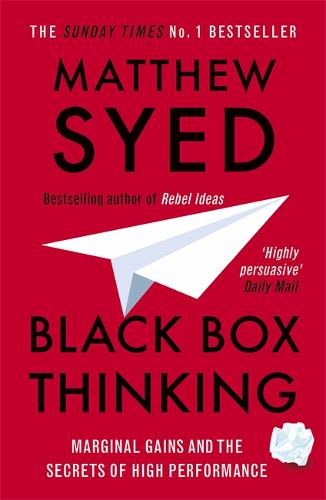
I started reading this book with the wrongful assumption that it would be technology focused, I had been led to believe this as the book has been mentioned in those circles many times. So what is the book actually about? Failure - and what happens when we can successfully keep learning from failure. The book takes the reader through a mix of interviews, stories and science to convincingly connect it’s narrative.
As the name suggests the book draws upon successful real world areas where we’ve been able to implement a system where failures are not ignored but embraced as the learning opportunitites they are, aviation is as safe as it is because of this. The justice system as well as medical institutions are two examples where there’s still a resistance to learning from failures. A respected professional with a lot of experience in their field can have an extremely hard time owning up to their mistakes, it’s very easy to ignore and come up with excuses instead of losing face.
Cognitive dissonance, pride, experience, time, environment and group think can all make it incredibly hard to fully appreciate mistakes and take corrective measures. If a group of people belonging to a cult or conspiracy theory is proven conclusively wrong it’s likely that they won’t correct themselves but instead double down on their conviction, this because the alternative has become too hard to face.
The author weaves everything together through antrophology, psychology and history - to create a convincing theory where the greatest successes in any field is built on the learnings of failures, the more efficient the feedback loop is the faster anything can be improved.
The world is extremely complex, discoveries, events and accidents might seem certain in retrospect but before conception they were all but. Celebrating a genius mind is a compelling human narrative - but what’s not shown is the huge amount of experimentation, failures and pure accident. A pundit can make the most complex and unlikely scenarios sound all but inevitable after the fact.
Highly recommend this book no matter what your background is.
Failure is a means - sometimes the only means - of learning, progressing and becoming more creative. This is a hallmark of science, where errors point to how theories can be reformed; of sport, where practice could be defined as the willingness to clock up well-calibrated mistakes; of aviation, where every accident is harnessed as a means of driving system safety.
Most closed loops exist because people deny failure or try to spin it. With pseudosciences the problem is more structural. They have been designed, wittingly or otherwise, to make fsilure impossible. Thst is why, to their adherents, they sre do mesmerising. they sre compatible with everything that happens. But that also means they cannot learn feom anything.
Errors can be thought of as the gap between what we hoped would happen, and what actually did happen.
Failure is inevitable in a complex world. Thus is precisely why learning from mistakes is so imperative.
It is those who are the most publicly associated with their predictions, whose livelihoods and egos are bound up with their expertise, who are most likely to reframe their mistakes - and who are thus least likely to learn from them
People are much quicker to try and confirm their theories than to disprove them .
Cognitive dissonance occurs when mistakes sre too threatening to admit to, so they sre reframed or ignored. This can be thought of the internal fear of failure: how we struggle to admit mistakes to ourselves.
it is possible to make significant progress against the biggest problem in the world through the accumulation of a set of small steps, each well thought out, carefully tested, and judiciously implemented
Every error, every flaw, every failure, however small, is a marginal gain in disguise
When we are dealing with complexity, blaming without proper analysis is one of the most common as well as one of the most perilous things an organization can do. And it restsein part on the erroneous belief that toughness and openness are in conflict with each other. They are not.